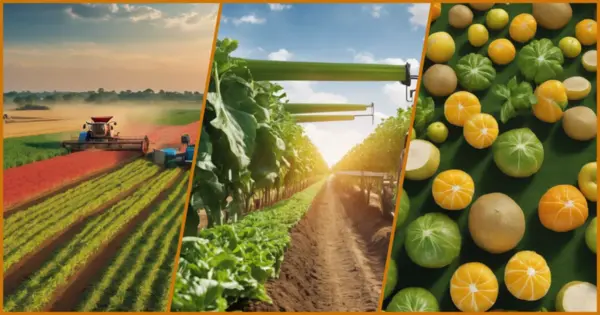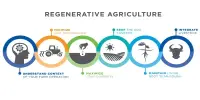Agribusiness refers to the commercial operations associated with the production, processing, and marketing of agricultural goods and services. It refers to the industry, companies, and field of research of value chains in agriculture and the bio-economy, which is also known as bio-business or bio-enterprise. It covers a vast range of activities, including farming, cattle production, agricultural cultivation, food processing, distribution, marketing, and retailing.
The major purpose of agribusiness is to maximize profits while meeting consumer demand for natural resource-related products such as biotechnology, agriculture, food, forestry, fisheries, fuel, and fiber. It frequently operates on a huge scale, leveraging current technologies and management approaches to enhance efficiency and profitability.
According to studies on company growth and performance in farming, effective agricultural enterprises are internally cost-efficient and operate in advantageous economic, political, and physical-organic contexts. They can grow and profit, increase land, labor, and capital productivity, and keep costs low to maintain competitive market prices.
Key components of agribusiness include:
- Farming: This involves the cultivation of crops and the raising of livestock for food, fiber, and other products.
- Agrochemicals: Agribusinesses produce and distribute fertilizers, pesticides, herbicides, and other chemicals used in agriculture to enhance crop yields and control pests and diseases.
- Agri-inputs: This includes seeds, seedlings, and other materials necessary for crop production.
- Food processing: Agribusinesses process raw agricultural products into value-added food products such as flour, dairy products, meat, and packaged foods.
- Distribution and logistics: Agribusinesses manage the transportation, storage, and distribution of agricultural products to markets and consumers.
- Marketing and retailing: Agribusinesses engage in branding, advertising, and selling agricultural products to consumers through various channels such as supermarkets, restaurants, and online platforms.
- Agricultural finance and insurance: Agribusinesses provide financial services such as loans, insurance, and risk management tools to farmers and other stakeholders in the agricultural supply chain.
Importance
Agribusiness is critical to global food production and supply chain management. It makes major contributions to global economic development, employment creation, and food security. However, it must also deal with difficulties such as environmental sustainability, resource management, market volatility, and regulatory compliance. Sustainable methods and technological advances are increasingly being used to address these issues and assure the long-term profitability of agribusinesses.
Agribusiness encompasses more than just farming. It covers a broader range through the agribusiness system, which includes input suppliers, value-added production, marketing, entrepreneurship, microfinance, and agricultural extension. In some countries, such as the Philippines, the establishment and management of agribusiness firms necessitate consultation with registered agriculturists above a specific level of activities, capitalization, land area, or number of animals on the farm.
















